Speaker Bios
Session I: CRITERIA FOR SELECTING A CANCER INDICATION FOR SUCCESSFUL NANO-BASED INTERVENTIONS
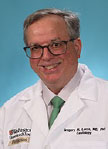
Dr. Gregory Lanza MD PhD is a Board-Certified Cardiologist and Professor of Medicine with adjunct appointments in Radiology, Biological Sciences and Bioengineering at Washington University Medical School (WUMS) in St. Louis, Missouri. He is an expert in molecular imaging and nanoparticle drug delivery as well as Advanced Cardiac Magnetic Resonance Imaging. He leads the Consortium for Translational Research in Advanced Imaging and Nanomedicine (“CTRAIN”) and holds the James R. Hornsby Family Professorship in Biomedical Sciences. He is an established NIH Principal Research Investigator awarded with numerous research grants over the last twenty plus years and over 270 peer-reviewed published manuscripts, 38 US issued patents and over 170 invited presentations. He received his PhD from the University of Georgia from which he joined the Monsanto Company in 1981. At Monsanto, he established and directed the preclinical research program for development of 14-day parenteral, a controlled-release product for bovine somatotropin which was marketed as Posilac. He received an MD degree at Northwestern University Medical School in Chicago and trained at Barnes-Jewish Hospital/WUMS for medicine internship, residency, and cardiology fellowship. He co-invented a novel perfluorocarbon (PF)-based, ligand-targeted contrast agent that was patented for use as a multi-modality imaging contrast and drug delivery agent and subsequently licensed to Kereos. Also, he co-invented FibroScint, a tetrameric 99mTc probe for thrombus, which is licensed to Capella Imaging, Inc, which he co-founded, and is near eIND submission in 2023. ErythroMer, was a polymeric encapsulate hemoglobin artificial blood substitute with a unique 2,3-DPG allosteric effector shuttle that was licensed to KaloCyte, Maryland. The company is continuing development with substantial federal and private funding. Alembic Pharmaceutical, LTD broadly licensed our target lipid-micelle and Sn2-lipase labile phospholipid prodrug technologies and is developing the initial product candidate to address drug-resistant breast cancer in bone. Dr. Lanza is the co-Editor-in-Chief of WIRES: Nanomedicine and Nanobiotechnology, Wiley, Associate Editor of Theranostics - Ivyspring, Associate Editor of Precision Nanomedicine - Andover House, Associate Editor of Circulation: Cardiovascular Imaging, AHA and an Associate Editor for both Nanomedicine: Nanotechnology, Biology, and Medicine, Elsevier and Contrast Media and Molecular Imaging, Wiley. Finally, in collaboration with United Imaging Healthcare and United Imaging Intelligence, Dr. Lanza seeks to democratize access and utility of cardiac MRI the world-wide using AI to accelerate and simplify operational challenges and to address the barriers for requisite image post processing. These scanners will nearly automatically capture and post-process patient cMRI images simultaneously, presenting the reader with both the processed data and images at once to the reader for interpretation and reporting.

Dr. Joelle Straehla is a pediatric oncologist at Dana-Farber/Boston Children's Cancer and Blood Disorders Center, an Instructor of Pediatrics at Harvard Medical School, and a Charles W. (1955) and Jennifer C. Johnson Clinical Investigator at MIT's Koch Institute. She received her MD from Northwestern University in 2013, and in 2016 completed a residency in pediatrics at the University of Washington/Seattle Children's Hospital. In 2017, during her fellowship in pediatric hematology/oncology at Dana-Farber Cancer Institute, Straehla joined Paula Hammond's lab at MIT's Koch Institute as a postdoctoral fellow, focusing her research on nanotechnology-based drug delivery platforms. She is board certified in general pediatrics and pediatric hematology/oncology, and her clinical practice is focused on the care of children with tumors of the brain and spinal cord, with a particular interest in alternative drug delivery strategies.
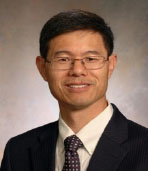
Dr. Wenbin Lin is the James Franck Professor of Chemistry, Radiation and Cellular Oncology, and the Ludwig Center for Metastasis Research. He is also a member of the Comprehensive Cancer Center at the University of Chicago. Dr. Lin obtained his BS from the University of Science and Technology in Hefei, China, and his PhD from the University of Illinois at Urbana-Champaign. He was a National Science Foundation postdoctoral fellow with Professor Tobin J. Marks at Northwestern University. Dr. Lin's research efforts focus on designing molecular materials for sustainability and human health and has published over 425 peer-reviewed articles with >73,000 citations. In particular, the Lin lab pioneered the development of metal-organic framework (MOF) catalysts for many transformations, and invented nanoscale MOFs for biomedical applications. Several of these innovative nanomaterials have entered clinical trials. He has been among the most cited chemists since 2014 and was selected as one of the top 10 chemists in the 1999-2009 decade based on per article citations. Dr. Lin is the founder of two clinical stage biopharmaceutical companies and has received numerous professional honors for his contributions to functional molecular materials.

Dr. Andre Nel, division chief and founder is nationally and internationally recognized for a pioneering role in the field of nanomedicine, as well as developing safe implementation of the technology for the benefit of humans and the environment. He serves as research director of the California NanoSystems Institute (CNSI), where he plays a lead role in launching multidisciplinary team science efforts, including in developing research platforms for nanotherapeutics in cancer, as well as serving as the director of the UC Center for Environmental Implications of Nanotechnology (UC CEIN). His personal research contributions have been the development of a variety of nanocarriers for the treatment of pancreatic cancer, including by inducing anti-cancer immunity. He also developed a tolerogenic nanoparticle platform for treatment of allergic and autoimmune disease. His outstanding scholarly contributions, culminated in several awards, including the Harry Truman Award and the California Governor's Environmental Economic Leadership Award. Collectively, his work has been cited over 75,000 times, including being nominated as a Highly Cited Researcher by Clarivate Analytics on several occasions. Dr. Nel also plays a leadership role in science and technology nationally, including helping to develop a US blueprint for the National Nanotechnology Initiative, serving on a US Bilateral Presidential Commission and preparing a report on the status of nanotechnology in the US for the President's Council of Advisors on Science and Technology.

Dr. Martignetti Professor in the Departments of Genetics and Genomic Sciences, Pediatrics, Obstetrics/Gynecology & Reproductive Sciences and Oncological Sciences at the Icahn School of Medicine at Mount Sinai and also the Network Director of the Laboratory of Translational Research at Nuvance Health based in Danbury, Connecticut.
Dr Martignetti received his undergraduate degree from Columbia College, his MD/PhD from the Mount Sinai School of Medicine and an M.Phil from Cambridge University. He is a human geneticist and pediatrician whose translational research expertise focuses on diagnostic and therapeutic development in human diseases with a particular focus in pediatric and women's health and cancers. To address these issues, The multi-institution Women's Health Biobank was developed and curated and is one of the largest biobanks devoted to women's health. It represents longitudinally collected tissue, uterine lavage, patient-derived cell lines, organoid cultures and blood samples and health data from >2,000 participants and more than 30,000 unique biosamples.
Dr Martignetti has authored more than 135 peer-reviewed articles, clinically described and named a number of human diseases/syndromes and characterized and identified disease-associated genes in more than 10 Mendelian disorders. He is also the co-Founder and CEO of MDDx, a women's health diagnostic company which was based on IP developed in his laboratory. He and his laboratory have mentored more than 125 students including postdoctoral and clinical/surgical fellows, graduate and master's students and medical, college and high school students.
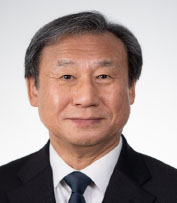
Dr. Kinam Park is the Showalter Distinguished Professor of Biomedical Engineering and Professor of Pharmaceutics at Purdue University. He received his Ph.D. degree in pharmaceutics from the University of Wisconsin in 1983. After postdoctoral training at the Department of Chemical Engineering of the same university, he joined the faculty of Purdue University in 1986. He became the Showalter Distinguished Professor of Biomedical Engineering in 2006.
He has studied drug delivery systems for more than four decades, focusing on the use of polymers for controlled drug release formulations. His recent research focuses on PLGA-based injectable, long-acting formulations for the delivery of small molecules, peptides, and protein drugs. He is currently developing 2~6-month long-acting naltrexone/buprenorphine injectable formulations for treating opioid use disorder. He is also developing new biodegradable polymers that can replace non-biodegradable single-use plastics.

Dr. Elias Sayour is an Associate Professor in the UF departments of neurosurgery and pediatrics at the University of Florida. He is also a principal investigator of the RNA engineering laboratory at the Preston A. Wells, Jr. Center for Brain Tumor Therapy. He received his bachelor's degree from Fordham University, his medical degree from the University of Buffalo and his doctorate from Duke University.
Dr. Sayour is a board-certified pediatric oncologist who has served as sponsor of multiple FDA-IND submissions leading to first-in-human clinical trials (NCT05264974, NCT04573140, NCT05660408). He has spearheaded creation of the UF Pediatric Cancer Immunotherapy Initiative (PCI2) and Large Animal Comparative Oncology Initiative and serves as principal investigator of the RNA Engineering Laboratory where he has been the primary inventor on several pending patent applications concerning the immunologic treatment of cancer.

Dr. Alexis Combes is holding the position of Assistant Professor, in the Department of Pathology at the University of California San Francisco (UCSF). Before Joining UCSF, Dr Combes obtained his PhD in immunology from the Centre d'Immunologie de Marseille-Luminy (CIML) in Marseille where he studied the regulation of protein trafficking in dendritic cell populations upon activation in viral infection and cancer. He then trained in the lab of Max Krummel as a postdoctoral fellow. Dr. Combes' lab employs a comprehensive systems immunology approach, harnessing cutting-edge immune monitoring and high-dimensional single cell technologies. This is applied not only to animal models and but also to clinical samples. This groundbreaking concept of immune archetypes extends beyond cancer. Consequently, the lab is actively engaged in constructing an atlas of diverse immune archetypes spanning various tissues and biological systems. This endeavor seeks to unearth parallels in immune states across different conditions. Ultimately, this knowledge holds the potential to revolutionize patient stratification through precise measurements of the immune system, thus enhancing both diagnoses and treatment outcomes. Through this work, the Combes lab aims to dissect the different immune archetypes in different contexts and will guide the development of relevant precision therapies that are aimed at adjusting the relative strengths of these archetypes depending on the diseases. Additionally, Dr. Alexis oversees the Disease-to-biology CoLab, a collaborative research initiative. Here, their team extends their expertise to the wider UCSF research community, specializing in immune system profiling across diverse sets of tissues and organisms.

Dr. Peter Nelson is a physician-scientist and Professor in the Divisions of Human Biology and Clini cal Research at the Fred Hutchinson Cancer Center (FHCC) and the Department of Medicine at the University of Washington. He is the Director of the Sloan Precision Oncology Institute, co-leads the FHCC Prostate Cancer Research Program and is PI of the NCI-supported Pacific Northwest Prostate Cancer SPORE. Dr. Nelson's research interests center on studies of mechanisms driving prostate carcinogenesis including both intrinsic features such as androgen receptor signaling, and influences of the tumor microenvironment relating to metastatic phenotypes and treatment resistance.

Dr. Andrew Z. Wang, Professor (Tenure), holds the A. Kenneth Pye Professorship in Cancer Research and is the Vice Chair for Translational Research and Commercialization in the Department of Radiation Oncology. Dr. Wang's research program is focused on the application of biomedical engineering to cancer research. His group aims to develop novel cancer diagnostics and therapeutics to improve cancer treatments. Dr. Wang has been elected as a member of the American Institute for Medical and Biological Engineering (AIMBE) College of Fellows and the American Society for Clinical Investigation (ASCI).
Clinically, Dr. Wang specializes in the treatment of genitourinary and gastrointestinal cancers. He is familiar with different radiation techniques, including Intensity-Modulated Radiation Therapy (IMRT), Image Guided Radiation Therapy (IGRT), Linac-based Stereotactic Radiosurgery (SRS), and intraoperative radiotherapy and interstitial brachytherapy.

Dr. Chong-xian Pan is a board-certified medical oncologist and hematologist, physician-scientist, clinical investigator, and immunologist. Currently, he is an Associate Professor of Medicine at Brigham and Women's Hospital of Harvard Medical School and Staff Physician at VA Boston Healthcare System. He received his MD at Fudan University Shanghai Medical College, PhD in Microbiology & Immunology at Loyola University Chicago, and MS in Clinical Research at University of California Davis. Dr. Pan is an internationally recognized genitourinary oncologist and has been invited to present at numerous national and international conferences. His laboratory research focuses on nanotheranostics and other drug development, cancer immunotherapy and patient-derived cancer models. Dr. Pan has translated his own preclinical studies into eight investigator-initiated clinical trials (IITs), obtained all the regulatory approvals and served as the PI of these trials. He organized Good Manufacturing Practice (GMP) formulations of four drugs used in six of these trials. For his research in nanotechnology, he and his collaborators have advanced one nanoparticle to a Phase I trial, two at the IND (Investigational New Drug) stage, and one at the pre-IND stage with more drugs in the pipeline.

Dr. Miles Miller is an Assistant Professor in the Department of Radiology at Harvard Medical School and Principal Investigator in the Center for Systems Biology at Massachusetts General Hospital. His team uses in vivo imaging techniques to study spatial cellular communication and drug action in the tumor microenvironment. He is an awardee of the NIH New Innovator and NCI Pathway to Independence Awards. As a postdoctoral fellow, Dr. Miller trained with Dr. Ralph Weissleder at MGH to understand and optimize nanotherapeutic behaviors in solid cancers. He received a Ph.D. in Biological Engineering from the Massachusetts Institute of Technology.
SESSION II. ADVANCING CLINICAL TRANSLATION OF NANOTHERAPEUTICS

Dr. Wimolnut Manheng is a senior toxicologist for the Office of Oncologic Diseases, Division of Hematology Oncology Toxicology. Dr. Manheng received her Ph.D. in Environmental Biology in March 2004 from the international education program between Suranaree University of Technology, Thailand and Virginia Commonwealth University, Richmond, VA. Her expertise is in immunotoxicology. She is a board-certified toxicologist with the distinction of Diplomate of the American Board of Toxicology. She reviews and evaluates the results of non-clinical, pharmacological and toxicological studies submitted by the drug sponsor/applicant in support of Investigation New Drugs (INDs), New Drugs Applications (NDAs), Biologicals License Applications (BLAs) amendments, supplements and other related scientific submissions to assess the safety of the drug based on toxicity experiments conducted by the applicant.
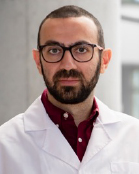
Dr. Chrysafis Andreou joined the faculty of Electrical and Computer Engineering of the University of Cyprus in August 2018 as a Lecturer (tenure track) and advanced to the rank of Assistant Professor in 2022. He is the director of the Nanotechnology, Imaging and Detection Laboratory (NIDL), a member of EMPHASIS Research Centre, and a partner of the Cyprus Cancer Research Institute (CCRI).
Chrysafis received two Bachelor's Degrees, in Physics and in Mathematics, from the Pennsylvania State University, and a Master's of Science in Electrical Engineering from the University of Cyprus. His doctoral studies took him to the University of California, Santa Barbara, where he received his Ph.D. in Biochemistry and Molecular Biology with a focus on Biomolecular Science and Engineering in 2013. There, he developed microfluidic systems for chemical detection and biofluid analysis based on controlled transport of plasmonic nanoparticles, and subsequent optical detection with surface enhanced Raman spectroscopy (SERS). His PhD project was multidisciplinary, on the boundary of fluid dynamics, analytical chemistry, and biomolecular engineering. He then worked as a Research Scholar (2014-2018) at the Department of Radiology of Memorial Sloan Kettering Cancer Centre (MSKCC) - consistently ranked among the best two cancer research institutes in the world. At MSKCC, he developed SERS nanoparticles functionalized against molecular targets, for optical spectroscopic imaging of microscopic tumors in mice.
Now, as Principal Investigator, he is bringing together his expertise in nanomedicine, microfluidic systems, and analytical chemistry to develop detection systems focused on personalized medicine. His research seeks to probe questions that will improve nanomedicine in preclinical settings and facilitate the introduction of nanosensors and nanotherapeutics to the clinic.

Twan Lammers obtained a D.Sc. in Radiation Oncology from Heidelberg University in 2008 and a Ph.D. in Pharmaceutical Technology from Utrecht University in 2009. In the same year, he started the Nanomedicine and Theranostics group at RWTH Aachen University. In 2014, he was promoted to full professor of medicine at RWTH Aachen University Clinic. His group aims to individualize and improve disease treatment by combining drug targeting with imaging. To this end, image-guided (theranostic) drug delivery systems are being developed, as well as materials and methods to monitor tumor growth, angiogenesis, inflammation, fibrosis, and metastasis. He has received multiple scholarships and awards, including ERC starting, consolidator and proof-of-concept grants, the CRS Young Investigator Award, the Adritelf International Award, the Belgian Society for Pharmaceutical Sciences International Award, and the JNB Trailblazer Award. He currently serves as the president of the Controlled Release Society and is a council member of the European Society for Molecular Imaging. He is a member of the editorial board of 10 journals, and acts as associate editor for JCR, DDTR and MIB. Since 2019, he is included in the Clarivate Analytics list of Highly Cited Researchers.

Dr Rafael T. M. de Rosales (RTMR) is Reader in Imaging Chemistry at the School of Biomedical Engineering & Imaging Sciences at King's College London. (>75 peer-reviewed publications, h=32). RTMR has extensive experience in multidisciplinary research involving the development and preclinical evaluation of a wide range of radiometal compounds (small molecules, nanoparticles, cell immunotherapies). He has significant experience as PI/co-I in several EPSRC/MRC/CRUK/WT/Research England projects, including industry (AstraZeneca, GSK, Theragnostics) and EPSRC programme grants EP/S032789/1 (MITHRAS) and EP/R045046/1. He plays leading roles in the European Society of Molecular Imaging and has supervised >15 PhD students/PDRAs. He was awarded the RSC Bill Newton Award (2018).

Jung Soo Suk, Ph.D. is Associate Professor of the Department of Neurosurgery and Medicine Institute for Neuroscience Discovery (UM-MIND) at the University of Maryland School of Medicine (UMSOM). Dr. Suk received Ph.D. degree at the Department of Biomedical Engineering at the Johns Hopkins University School of Medicine (JHUSOM). Prior to joining the UMSOM, he served as Assistant Professor at the JHUSOM and currently holds adjunct faculty positions at Neurosurgery and Chemical & Biomolecular Engineering departments of the university. Dr. Suk's research focus lies in physicochemical characterization of biological barriers to systemic and localized therapeutic delivery and development and preclinical validation of nanotechnology-based therapeutic delivery platforms capable of overcoming those barriers. Specifically, Dr. Suk's lab develops nanocarriers based on synthetic (e.g., polymer, peptide) or naturally derived (e.g., protein, virus, extracellular vesicle) materials that provide safe, efficient, and/or targeted delivery of a wide array of therapeutic payloads, spanning small molecule drugs, nucleic acid-medicines, and proteins, for treating various diseases. Based on comprehensive understanding of material science, biophysics, engineering, and medical biology, Dr. Suk's lab has developed a variety of therapeutic delivery platforms that overcome biological barriers and provide sustained and/or targeted delivery of therapeutic payloads to the target tissues of our interest, including but not limited to brain. Dr. Suk's work has been published in well-respected peer-reviewed scientific journals, including Journal of Controlled Release, Biomaterials, Molecular Therapy, Angewandte Chemie, PNAS, Nano Letter, Small, ACS Nano, Science Advances, Journal of Extracellular Vesicles, etc. and has resulted in numerous patent filings. Dr. Suk's research to date has been funded by TEDCO (Maryland Entrepreneur Funding and Investments), Cystic Fibrosis Foundation, Focus Ultrasound Foundation, W.W. Smith Charitable Trust, and primarily by the National Institute of Health.
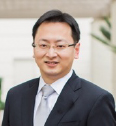
Wen Jiang is an Associate Professor of Radiation Oncology at University of Texas MD Anderson Cancer Center. He received his Ph.D. in Biomedical Engineering at the University of Toronto and M.D. from Stanford School of Medicine. He completed his residency training in Radiation Oncology at MD Anderson Cancer in 2018 and was recruited to UT Southwestern as a tenure-track Assistant Professor of Radiation Oncology and a CPRIT Scholar. He returned to MD Anderson Cancer Center in early in 2021 as a tenure-track assistant professor. Dr. Jiang was recently promoted to Associate Professor with tenure in 2023. As a physician scientist, Dr. Jiang's clinical focus is on the treatment of primary and metastatic CNS tumors. His laboratory research aims to identify ways to promote innate immunity as a new strategy to eliminate cancer using bioengineering, protein engineering and nano-engineering approaches. As the principal investigator, Dr. Jiang's research is supported by multiple grant funding from the NCI, NINDS, DOD, CPRIT and Susan Komen Foundation.
